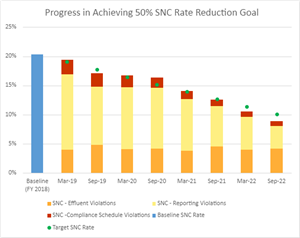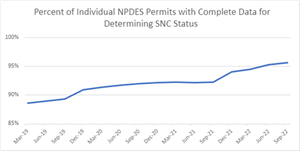EPA reports significant drop in Clean Water Act violations
(UC) — The number of Clean Water Act breaches recorded to the Environmental Protection Agency (EPA) has reduced by more than half in the years after an interstate compliance agreement, according to the EPA, which revealed the figures on Tuesday.
In 2018, the EPA and 47 states agreed to cut noncompliance with the legislation by half over the next five years. According to the government, the program met its goal ahead of time, reducing noncompliance from 20.3 percent in early 2018 to 9%. The effort applied to around 46,000 sites across the country that are subject to Clean Water Act regulation.
“Five years ago, EPA set an ambitious goal for cutting the rate of significant noncompliance with Clean Water Act permits in half,” Larry Starfield, acting assistant administrator for the EPA’s Office of Enforcement and Compliance Assurance, told The Hill who reported the story.
“Today I’m pleased to announce that we have met and exceeded that target achieving a historically low rate of 9. This notable achievement speaks to what EPA and the states can accomplish together to improve compliance and reduce Clean Water Act violations.”
According to the EPA, progress on the initiative has reduced the number of facilities with "significant non-compliance" violations by about 4,000 and eliminated approximately 23.7 million pounds of illegally discharged water pollutants.
The accomplishment was ascribed to a combination of state-federal cooperation, including over 600 meetings with individual state regulators.
The statement comes as the EPA is allegedly exploring a long-term presence in Jackson, Mississippi, following flooding that destroyed the city's water treatment plant, resulting in the city's second water crisis in as many years.
The City Council decided this week to enter into a "interim stipulated order" with the EPA for a year, to be carried out through a third party. EPA Administrator Michael Regan stated that the accord must still be authorized by a federal judge and that other long-term measures are being discussed.
Related News
From Archive

- Glenfarne Alaska LNG targets late-2026 construction start for 807-mile pipeline project
- U.S. water reuse boom to fuel $47 billion in infrastructure spending through 2035
- $2.3 billion approved to construct 236-mile Texas-to-Gulf gas pipeline
- Major water pipe break in Puerto Rico hits over 165,000 customers
- Potomac River Tunnel project enters construction phase beneath Washington, D.C.
- Pennsylvania American Water launches interactive map to identify, replace lead water service lines
- Trump's tariffs drive $33 million cost increase for Cincinnati sewer project
- Utah city launches historic $70 million tunnel project using box jacking under active rail line
- Tulsa residents warned after sewer lines damaged by boring work
- Fatal trench collapse halts sewer construction in Massachusetts; two workers hospitalized





Comments